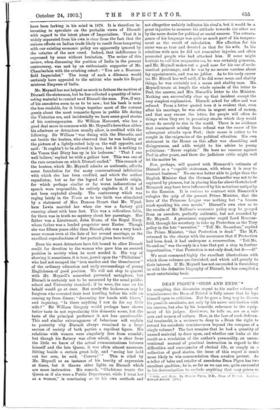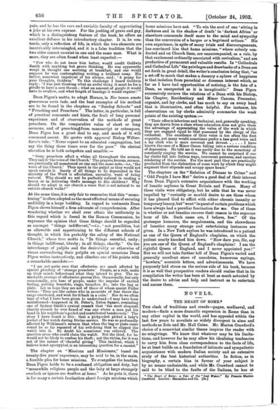DEAN PIG OU'S "ODDS AND ENDS." * IN compiling this
discursive sequel to his earlier volume of reminiscences the Dean of Bristol is fully aware that lie lays himself open to criticism. But he goes a long way to disarm his possible assailants, not, only by his naive satisfaction with his success, but also by his honorific reference to the equip- ment of his judges. Reviewers, he tells us, are as a rule men and women of culture. How, in the face of such deferen- tial treatmeht, is a reviewer to deny to a Dean the right to extend his anecdotic reminiscences beyond the compass of a single volume ? The fact remains that he had a quantity of unused material to draw upon, and whether one looks at the result as a revelation of the author's personality, an uncon- ventional manual of practical instruction in regard to the difficulties and emergencies of clerical life, or simply as a collection of good stories, the issue of this sequel is much more likely to win commendation than awaken protest. As a teller of tales and retailer of anecdotes Dean Pigou has two excellent qualities; be is, so far as we can see, quite successful in his determination to exclude anything that may grieve or
• Odds and Ends. By Francis Figou, D.D., Dean of Br:stol. Loadon Edward Arnold. [168.]
pain, and he has the rare and enviable faculty of appreciating a joke at his own expense. For the jostling of grave and gay, which is a distinguishing feature of the book, he offers an excellent defence in his introductory chapter. It is, he con- tends, only a reflection of life, in which the two elements are inextricably intermingled, and it is a false tradition that the two sides cannot co-exist, in one and the same man. What is more, they are often found when least expected :—
" Few who do not know him better, would credit G-oldwin Smith with anything but grave thinking. He was apparently wrapt in thought one morning at breakfast, and one would suppose he was contemplating writing a brilliant essay. His father, somewhat impatient of his silence, said : A penny for your thoughts, Goldwin.' To this challenge I heard Groldwin reply : was just thinking what an awful thing it must be for a giraffe to have a sore throat ; what an amount of gargle it would have to swallow, and what length of bandage it would require!'"
Dean Pigon's motto, to adapt Horace, is Nec tamen amoto quaeramus seria ludo, and the best examples of his method are to be found in the chapters on "Sunday Schools" and "Preaching and Preachers." The latter, in particular, is full of practical comments and hints, the fruit of long personal experience and of observation of the methods of great preachers. On the comparative value of short or long sermons, and of preaching] from manuscript or extempore, Dean Pigou has a great deal to say, and much of it will command assent. He quotes with approval Bishop Wilber- force's rule : "Never repeat to an educated congregation, but say the thing three times over for the poor." On clerical elocution he is both outspoken and sensible :—
"Some preachers affect a whine all throughout the sermon. They call it the voice of the Church.' The prayers, lessons, sermon, are practically all monotoned on one and the same note,—i.e., 'the voice of the Church.' They speak in the pulpit as they would not speak outside it. Surely of all things to be deprecated in the ministry of the Word is affectation, unreality, want of being natural. Why should we not be perfectly natural in reading a lesson or in delivering God's message to His children ? Why should we adopt in our church a voice that is not natural to us outside church walls?"
At the same time, it is only fair to remember that this " mono- toning " is often adopted as the most effectual means of securing
audibility in a large building. In regard to vestments Dean Pigou shows himself a firm advocate of comprehension. After wondering whether we shall ever attain the uniformity in this regard which is found in the Roman Communion, he expresses the opinion that these things should be regarded as amongst "things indifferent,"—i.e., not puerilities, but as allowable and appertaining to the different schools of thought, in which lies probably the safety of the National Church," whose true motto is, "In things essential, unity ; in things indifferent, liberty ; in all things, charity." On the interchange of pulpits and the desirability or otherwise of vicars surrendering their pulpits on special occasions Dean Pigou writes instructively, and clinches one of his points with a remarkable anecdote :— " I am not quite sure that offertories are much affected by special pleading of strange preachers.' People, as a rule, make up their minds beforehand what they intend to give. The re- markable average of offertories proves this. Occasionally, but only occasionally, you hear of people, under the impulse of excited feeling, putting bracelets, rings, brooches, &c., into the bag or plate. Let us hope they are not of those of whom quaint Fuller writes : They are like sailors who in moments of fear throw the cargo overboard, and wish for it back in a calm.' Nor do we often hear of what I have been given to understand—I may have been misinformed—happened in St. Peter's, Eaton Square, reminding one of Sydney Smith's cynical remark that the most eloquent charity sermon he ever heard of was one whore a man put his hand in his neighbour's pocket and contributed handsomely.' The story I have heard is this : that a pickpocket picked a lady's pocket of her watch during Divine service. He was so profoundly affected by Wilkinson's sermon that when the bag or plate came round he so far repented of his evil-doing that he slipped the watch into it. No doubt his conscience was relieved. The question arose who could claim the watch. Not the thief, for he would not be likely to confess his theft ; not the victim, for it was not of the nature of 'cheerful giving.' This incident, which I believe is slot apocryphal, is an interesting question for a casuist."
The chapter on "Missions and Missioners," based on twenty-five years' experience, may be said to be, in the main, a forcible plea for home missions. To evangelise the heathen Dean Pigou holds to be a confessed obligation and duty, but "meanwhile religious people and the laity at large strangely overlook or ignore our heathen at home." As he puts it, there is for many a certain fascination about foreign missions which
home missions have not. "To win the soul of one sitting in darkness and in the shadow of death' in darkest Africa' or elsewhere commends itself more to the mind and sympathy than the conversion of a bargee or a begrimed artisan." His own experience, in spite of many trials and discouragements, has convinced him that home missions, "where soberly con- ducted and on Church lines, are unaccompanied, as a rule, by that excitement ordinarily associated with revivalism," and are productive of permanent and valuable results. In "Cathedrals and Cathedral Life" the privileges and drawbacks of a Dean are set forth in great detail, the writer's conclusion being that, "as a set-off to much that makes a deanery a sphere of happiness is that isolation from parochial or diocesan interest which, as far as I have had opportunities of noticing, is the fate of a Dean, as unexpected as it is inexplicable." Dean Pigou successively reviews the relations of a Dean with his Bishop, his Chapter, Residentiary and Minor Canons, Precentor, organist, and lay clerks, and has much to say on every head that is illuminative, and often helpful. For instance, his observations on lay clerks admirably summarise the weak points of the existing system :—
" Their office is laborious and technical, and, generally speaking, they are drawn from a class whose education does not give them the advantage of appreciating the value of the work in which they are engaged equal to that possessed by the clergy of the cathedral. The excellence of their voice is too often the first requisite, yet many would sometimes prefer a leas good voice and a lay clerk who is more reverent and devout I have known the case of a Minor Canon falling into a serious condition of depression. He told me it was partly due to the monotony of constantly singing the service. We cannot be surprised if our lay clerks fall into listless ways, irreverent postures, and careless rendering of the service. For the most part they are practically precluded from the distraction of some work by which they might augment their stipends and occupy spare hours."
The chapters on the "Relation of Disease to Crime" and "Odd People I have Met" derive a good deal of their interest from Dean Pigou's extensive acquaintance with the working of lunatic asylums in Great Britain and France. Many of these visits were obligatory, but he adds that he was never impelled by "curiosity or morbid desire to see those whom
it has pleased God to afflict with either chronic insanity or temporary lunacy, but" went "inquest of certain problems which have always had a peculiar fascination for me. One of these is whether or not lunatics recover their reason in the supreme hour of life. Such cases are, I believe, few." Of the grotesque humours, the megalomania, and the shrewdness of lunatics many strange and entertaining instances are given. In a New York asylum he was introduced to a patient as one of the Queen of England's chaplains, on which the patient nearly knocked him down. "How dare you, Sir, say you are one of the Queen of England's chaplains! I am the rightful Queen of England, and I never appointed you!" But we will not take further toll of Dean Pigou's varied and generally excellent store of anecdotes, humorous sayings, "howlers," eccentric letters, and advertisements. We have purposely laid stress on the serious side of his book, because it is as well that prospective readers should realise that in its compilation the writer has been at least as much actuated by the desire to advise and help and instruct as to entertain and amuse them.























































 Previous page
Previous page